I’m so glad you asked, because it’s the first week of the semester, so I’ve been thinking about this a lot!
There are a ton, and I mean a TON of articles written about psychology (and I’ll include some great ones at the bottom of the post), but this specific post will reflect how I talk to my students about the study of human thought and behavior.
Some students come to college knowing that they have an interest in psychology. They may have taken an AP class or psychology elective in high school, but many (including my own high school) don’t offer it. Since a lot of my freshman students have never taken a psychology course before, I ask them on day 1 what comes to mind when they hear” “Psychology.”
The predominant response is always “THERAPY!”

I would have said the same thing as a freshman- what I knew about psychology was what I had seen in movies and on TV, which I can trace back to “The Sopranos.” For me, “psychology” looked like this:

For older generations, they may picture the oft-portrayed image of a classical psychodynamic approach of therapy that was portrayed so well in “Mad Men”

Some students have direct experience from working with a therapist themselves, or from being involved in family therapy. They may have felt some benefit and, in turn, want to return the favor. In fact, pretty much all of my students identify as “helpers” who want assist others in a mission-driven career. It tends to be a very empathetic community, which is why it attracts so many empathetic people.
Therapy is certainly an important domain, and one that plays well on media, so it’s no surprise that it becomes inextricably linked to “psychology.” But “psychology” is so much more than just therapy!
The American Psychological Association offers information on 15 subfields of psychology.
There are a lot of VERY HOT fields in this mix, including “Climate and Environmental Psychology” and “Human Factors and Engineering Psychology.” You’ll likely find subfields on this list that interest you, and that’s because psychology is a diverse, progressive, and rapidly-evolving science.
I remember meeting with a student who was convinced that psychology was not a “hard science.” And, I disagree! Depending on your school, psychology may be defined as a “science” or a “social science,” but make no mistake, you can’t fully understand the psychological domain without an understanding of quantitative reasoning, statistics, and research methodology.
Psychology grads can work in any domain. The skills that psychology students learn are valued by academia and bankable in industry. It’s an incredibly popular minor too, because it interfaces well with other majors including social policy, business, marketing, computer science- you name it.
Some psychology kids also become entrepreneurs.

Suggested reading:
Homepage: American Psychological Association (APA)
Homepage: National Institute of Mental Health NIMH » Home (nih.gov)
